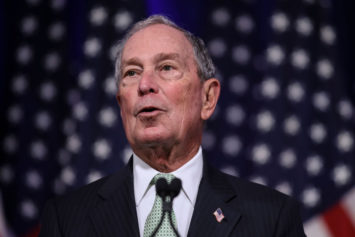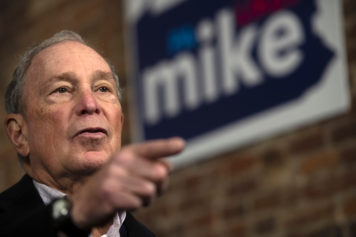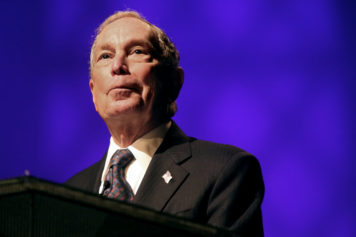In yet another stumble on race relations, New York Mayor Michael Bloomberg stirred anger by suggesting on a radio show yesterday that public housing residents should be fingerprinted to help curb crime in the city’s housing projects.
“What we really should have is fingerprinting to get in,” Bloomberg said during a weekly discussion with the station’s John Gambling. “We’ve just got to find some ways to keep bringing down crime there.”
The comments came as city lawyers filed a notice of appeal of the federal judge’s ruling that the city’s stop-and-frisk policy, which Bloomberg has vociferously defended, violates the constitutional rights of blacks and Latinos. The judge also imposed reforms on the police department.
“We have moved ahead with our formal filings,” said Michael A. Cardozo, head of the city Law Department. “The mayor, the police commissioner and the city vowed to press forward immediately with an appeal – and we have done so. The safety of all New Yorkers is at stake.”
The mayor has consistently shown a tin ear of late to the concerns of New York’s minority residents. During the stop-and-frisk trial, Bloomberg even suggested that the city doesn’t stop enough black and Latino men, considering their proportion in the population and who the perpetrators are of the majority of the crimes.
Bloomberg said on the radio show that residents of the New York City Housing Authority make up about 5 percent of the city’s population, but that the complexes account for about 20 percent of the city’s crime.
“Mayor Bloomberg’s derogatory statements about public housing residents are an outrage,” Sherrilyn Ifill, president and director-counsel of the NAACP Legal Defense and Educational Fund, said in a statement.
“Families live in public housing apartments, not criminals,” Ifill said. “Public housing residents, as well as their friends and family members visiting them, deserve the same level of respect from our mayor as any other New York City resident. They should not be treated like prisoners in their own homes.”
But a spokesman for Bloomberg said fingerprinting is the next realm of modern-day security.
“All security is moving toward biometrics—even the next iPhone will have fingerprint security,” the spokesman, Marc La Vorgna, told Politicker.com.”Every day the mayor logs into his own computer by placing his finger on the keyboard to log in. Why wouldn’t we want to think about providing the highest level of security possible for NYCHA residents?”
A New York Times poll revealed that New Yorkers are deeply conflicted about Bloomberg’s three terms in office, overwhelming embracing some of his most unusual and controversial behavior-modification policies, such as restricting smoking, encouraging biking and exposing calorie counts. But they also think he paid more attention to the concerns of the wealthy, he was disproportionately interested in Manhattan and he didn’t do enough to improve the public schools.
Asked to rate Bloomberg’s 12 years as mayor, 52 percent describe them as fair or poor, compared with 46 percent who label them as excellent or good. Compared with past mayors, 38 percent ranked Bloomberg as average, which could not be welcome news to a man who thinks very highly of himself. Twenty-one percent say he is above average and 15 percent say he is one of the best.
As for quality of life in New York, 40 percent say it has stayed the same, 35 percent think it has become better, and 23 percent say it has gotten worse.
He has a $27 billion fortune, but the mayor will likely be pleased to know 55 percent of respondents say he cares “some” or “a lot” about the needs and problems of people like themselves, compared with 43 percent who say he cares “not much” or “not at all.”
The poll of 1,029 adult New Yorkers was conducted Aug. 2 through 7 with a sampling error of minus 3 percentage points.
But as for life in New York during the Bloomberg era, 85 percent say New York is becoming too expensive for people like them to live in—nearly two-thirds say it is harder to make ends meet in New York than in other large American cities.
Asked about his experiments in behavior modification, 82 percent approve of his smoking ban inside restaurants and bars; 81 percent approve of his requirement that fast-food chains post calorie counts on menus; 85 percent approve of his mandate that restaurants display the letter grades given to them by the city; 72 percent approve of the pedestrian plazas he ordered installed around the city; 64 percent approve of the bike lanes he had constructed; and 73 percent approve of the bike-sharing program he created.
But by a wide margin, people oppose his attempt to reduce obesity by limiting sales of sugary drinks in containers larger than 16 ounces—59 percent objected to the regulation, which was struck down by a state court this year and never enforced.
As for stop-and-frisk, 50 percent approve of it and 47 percent disapprove of it, according to the poll, which was conducted before a federal judge ruled it violated New Yorkers’ rights by singling out young black and Hispanic men. Only 28 percent of black residents support it, compared with 55 percent of whites and 59 percent of Hispanics.
Overall, 49 percent of New Yorkers approve of Bloomberg’s job performance, but only 38 percent of black residents, compared to 55 percent of whites and 49 percent of Latinos.
On the topic of race relations, while during the administrations of Rudy Giuliani and David Dinkins the percentage of New Yorkers who rated race relations as “generally good” mostly stayed in the mid-20s and 30s, dipping to a low of 19 percent in 1993, there has been vast improvement under Bloomberg, who has generally defused racial tensions by avoiding incendiary rhetoric and forging close ties to civil rights leaders like the Rev. Al Sharpton.
The poll number has been as high as 63 percent, and sits at 59 percent as he leaves office—though he has stumbled of late.
Two-thirds of respondents believe he is either very likely or somewhat likely to seek public office in the future, while 50 percent seem displeased by the prospect, saying he should not bother. If he tried to seek a fourth term, 57 percent said they would not vote for him.


